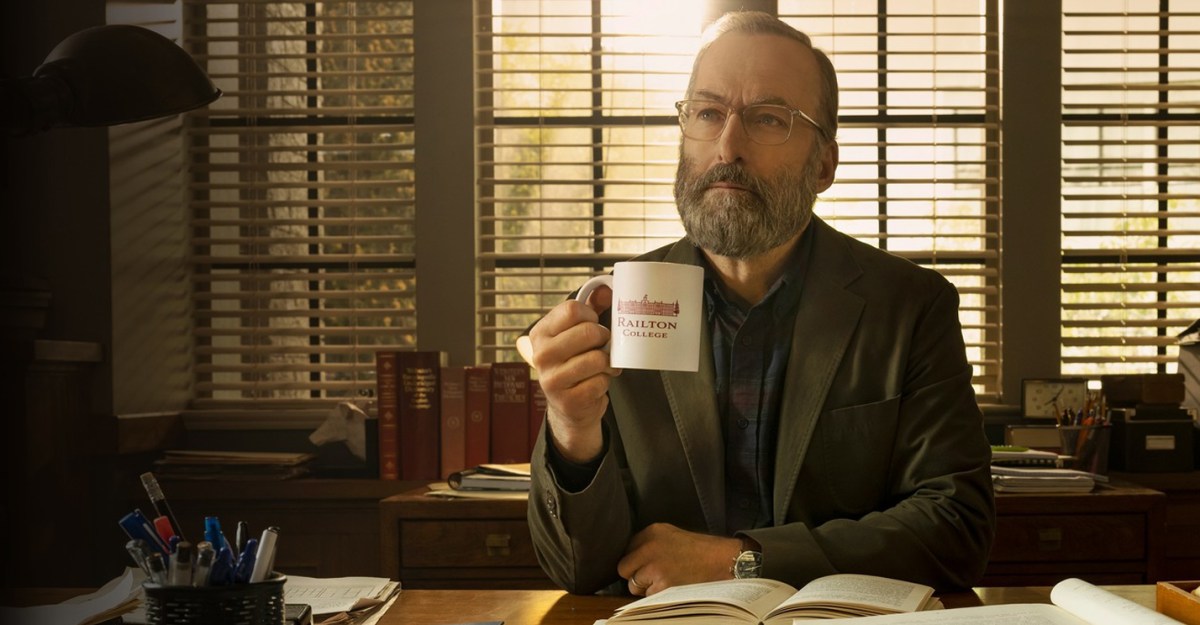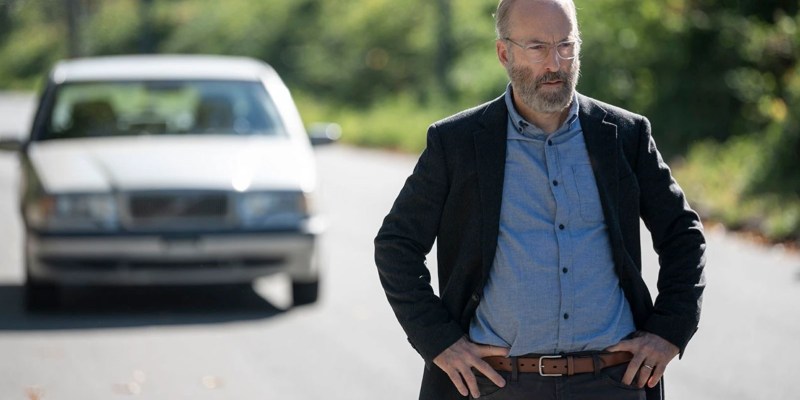This discussion and review of the Lucky Hank premiere episode on AMC contains some light spoilers. Lucky Hank premieres on March 19.
Lucky Hank is about a perfectly average man and his midlife crisis. The eight-episode series is based on the 1997 novel Straight Man by Richard Russo, and it follows an English professor at a rural Pennsylvania college as he grapples with middle-aged insecurity and boredom. The drama / comedy stars Bob Odenkirk as Hank and Mireille Enos as his wife Lily.
Lucky Hank comes from co-showrunners Aaron Zelman (The Killing) and Paul Lieberstein (The Office), along with a team of executive producers that include Bob Odenkirk, Richard Russo, and Mark Johnson (who also produced Breaking Bad and Better Call Saul). I’ve written before about the kind of quality that we’ve come to expect from AMC — character-driven stories that feature excellent settings and really build full, believable worlds for our characters to live in. While not all AMC series may quite live up to that gold standard, judging from the pilot episode alone, Lucky Hank very well might join those ranks.
Hank — Henry Devereaux Jr., to be exact — is grumpy. We meet him as he stares blankly across his college campus and enters a classroom to be absolutely pummeled by a student’s terrible writing. He’s completely checked out. When his students pressure him to say something, he gives them his honest feedback — that Railton College is “mediocrity’s capital.” While not a planned outburst, this shakes things up in a way that Hank has been craving. He’s bored. The young student that Hank insulted most directly in his outburst, Bartow (Jackson Kelly), demands an apology, and rather than saying what he needs to say to move along and keep his job security, Hank doubles down on what he said and refuses to apologize. He’s now a man (slightly) unburdened, his true thoughts no longer shelved.

You can’t talk about Bob Odenkirk on a new television series without talking about the legendary character, Saul Goodman. Better Call Saul, which ran from 2015-2022, was one of the best television shows of recent years. Odenkirk was nominated for six Emmys for his performance as Saul Goodman / Jimmy McGill, and while he didn’t win any, it was truly an outstanding television show, led by Odenkirk’s performance. Saul Goodman was first introduced to audiences in Breaking Bad — another one of the best television shows of all time. Better Call Saul would not have existed had Odenkirk not made Saul Goodman such an interesting character. Exploitative in nature but somehow strangely likable and funny, Saul Goodman was the kind of character that people just wanted to see more of. And so, he got his own show.
Bob Odenkirk’s performance as Hank Devereaux is also interesting enough to warrant an entire show about this very average man. The character is beaten down by life, not unlike Jimmy McGill after his time as Saul Goodman. But it doesn’t seem like Hank has been disparaged by anything particularly troubling. He’s tired because of his own complacency. Hank, in contrast with the lonely Jimmy McGill, has a good marriage and, it seems like, a decent relationship with his kid. He’s got a house and tenure at his job.
It’s the kind of thing that so many American people would love to have — safety, stability, support — but rather than being grateful, Hank’s focused on what he doesn’t have. Why he feels that he and everyone at Railton College around him are mediocre has more to do with Hank’s internalized shame than the actual talent (or lack thereof) of those around him.

It’s a point driven home by the first interaction we see Hank have with his wife, Lily. She’s an optimist, and she’s mostly pretty happy. She’s a vice principal at a public school, so it makes sense that she’d need to be a bit more optimistic than her miserly husband. Hank is essentially miserable for no real reason — maybe he’s depressed? It will be interesting to see if the series will explore Hank’s mental health and what he chooses to do about it, sort of like Tony Soprano coming to terms with his depression, or if Hank will just keep on being cranky.
Hank’s got some unresolved conflict with his father, and while he’s totally in denial about how these issues are affecting him, his wife can see that they are. His father retires, and Hank finds out about it because a major newspaper has published an announcement about his retirement. If Hank is trying to live up to his father’s legacy, he’s apparently got some pretty big shoes to fill. All that we really know about Hank and his dad, though, is that they haven’t spoken for 15 or so years. It’s easy to surmise that this will be what much of the show is about. How did Hank get here, to this place where he has everything he thought he wanted and he’s happy with none of it?
Hank’s colleagues include a diverse cast of characters —including but not limited to Oscar Nunes, Arthur Keng, and Shannon DeVido — who are mostly offended by Hank’s insistence at Railton College’s mediocrity. With the self-importance of the self-published, some of his colleagues conspire to remove him as head of the English department. The scenes amongst Hank’s colleagues are the funniest of this premiere episode.

While Bob Odenkirk has been writing for television since the late 1980s, he wasn’t recognized for his acting until Breaking Bad. He made Saul Goodman into an iconic character, and it’s possible that Hank Devereaux will be a character who resonates with people in the same way. With Lucky Hank being a limited series instead of a years-long show, there won’t be the same opportunity for viewers to get attached to Hank in the same way, but it’s great to see Odenkirk continue his streak of excellent character performances. Recently, Odenkirk has also filmed a remake of The Room with charity group Acting for a Cause. The Room is unquestionably bad, and it will be great to see what Odenkirk can do with Tommy Wiseau’s creation.
Odenkirk narrates Lucky Hank with a bored drawl that will shape how we see this AMC television series and Hank himself, giving us an extra layer of insight to Hank’s interior battles and internal monologue. While Hank seems so down and tired of everything, there’s a somewhat snarky sense of humor to his narration. He’s curmudgeonly, and he’s embracing it — and it seems like Odenkirk is having fun with the character. While episode 1 of Lucky Hank sets the tone for the show and shows us who Hank is and where he is in his life, the limited series will bring us with Hank as he complains and fumbles through the later part of his career. Hank might be a pretty miserable guy, but I still can’t wait to see where Odenkirk takes him.
